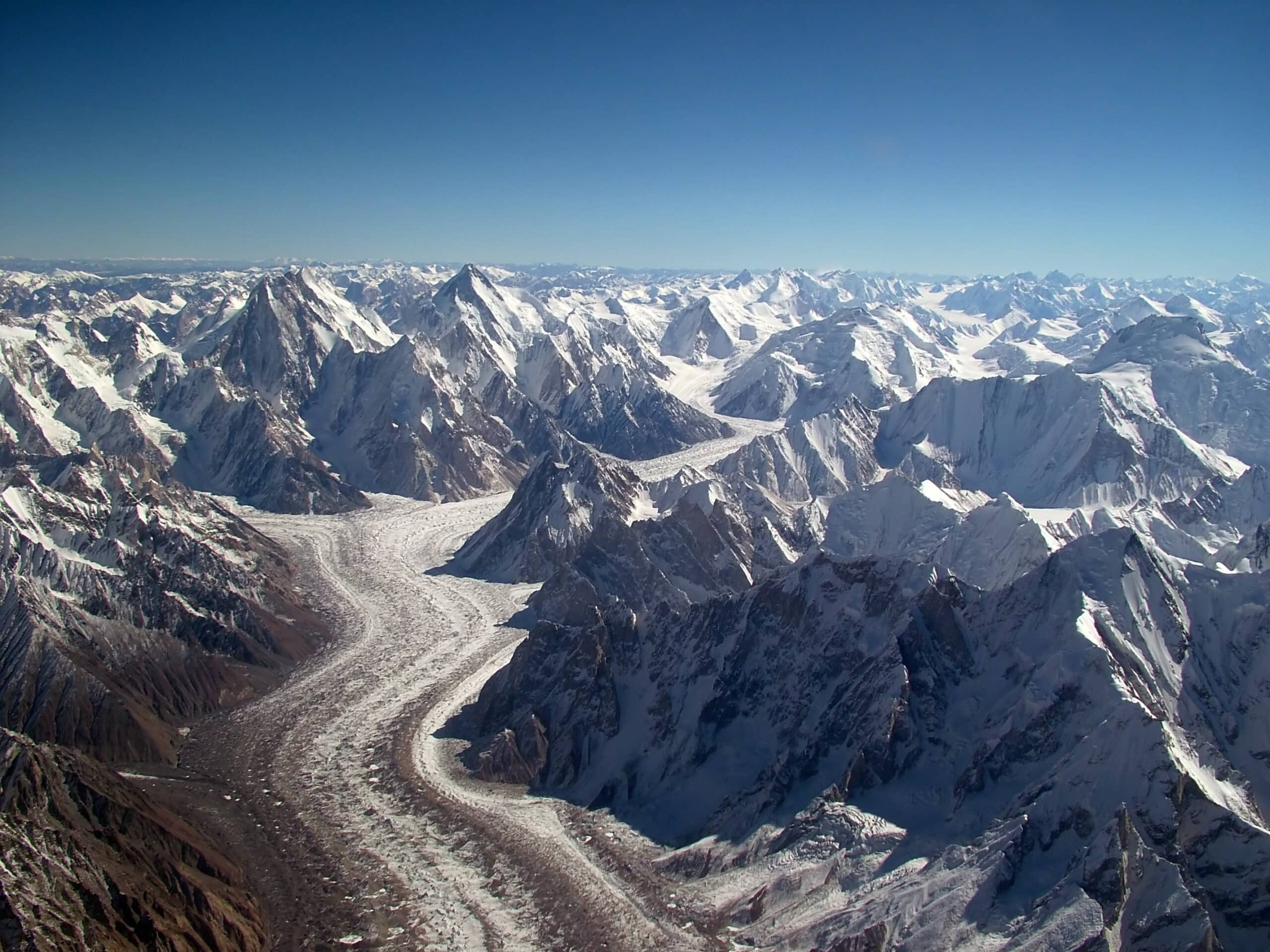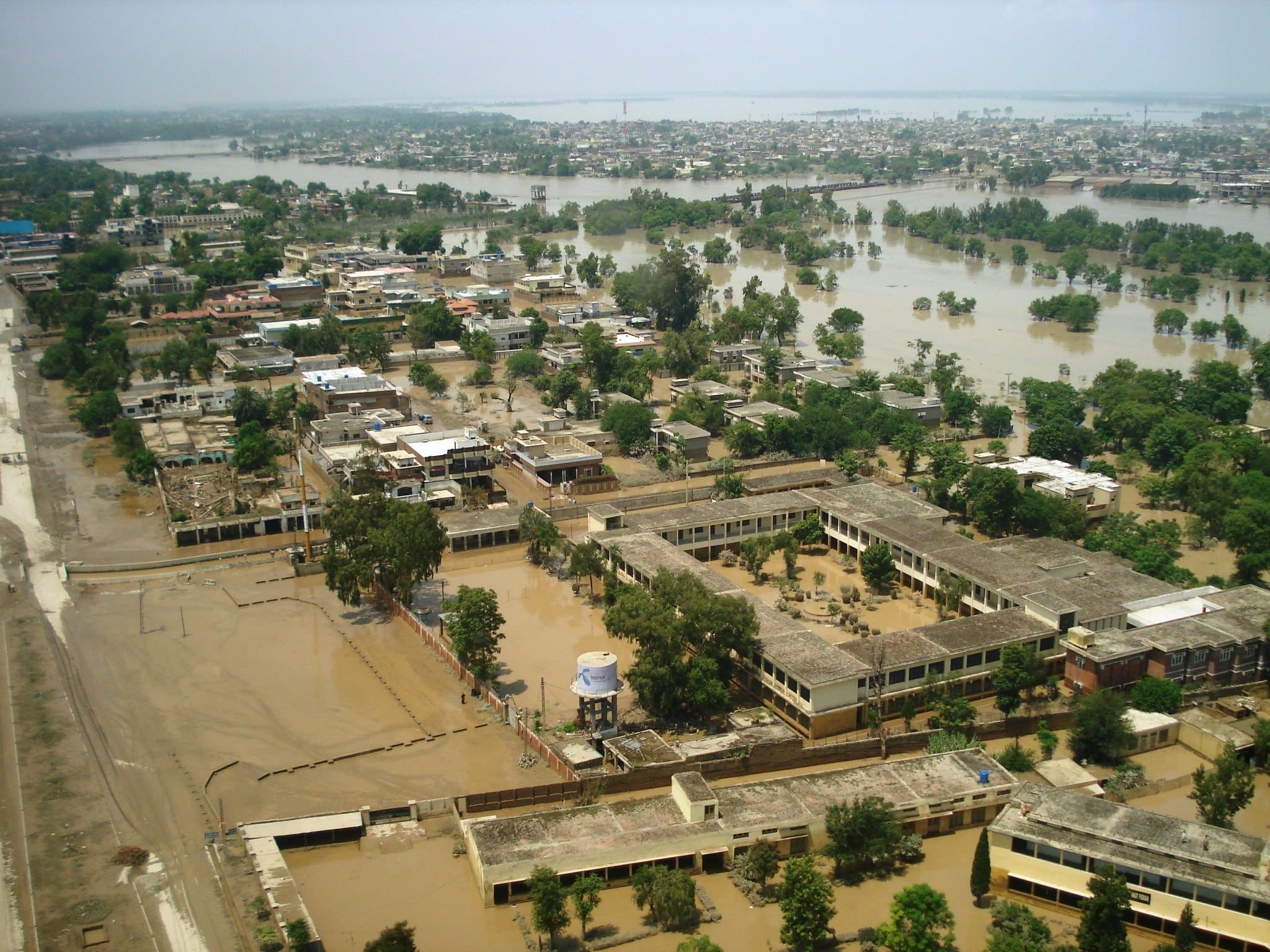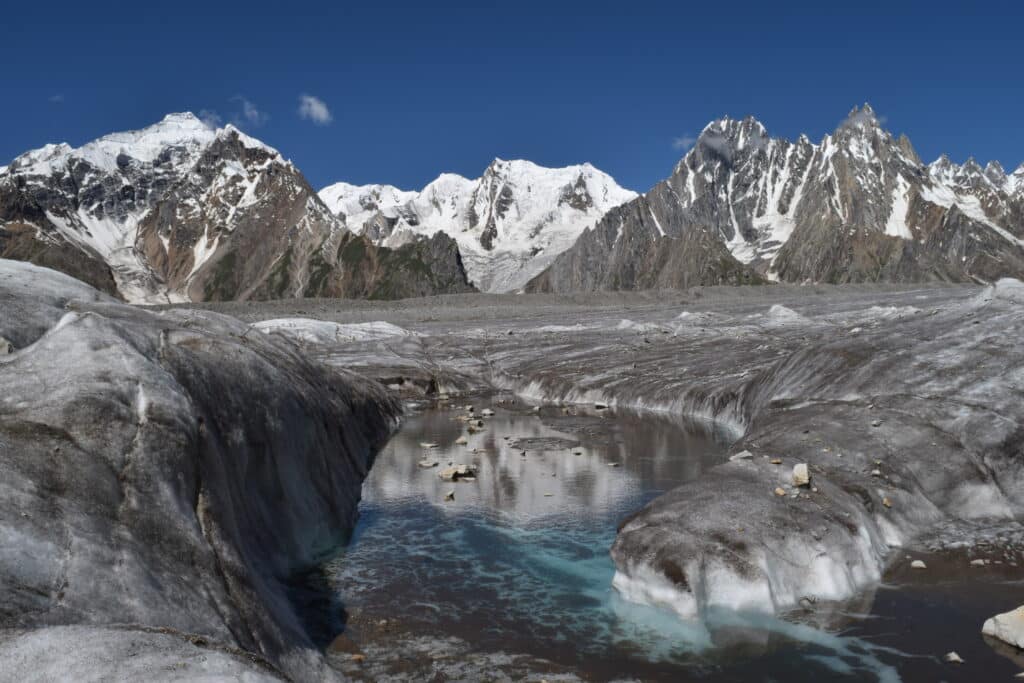Outside the polar region, Pakistan is the country with the highest number of glaciers in the world. However, a combination of anthropogenic climate change and air pollution from neighbouring countries like India and China has significantly contributed to the rapid melting of these glaciers, causing devastating floods that have affected Pakistan’s economy. This article suggests several measures to address the issue of melting glaciers in Pakistan and mitigate the impact of climate change in the region, from reducing emissions and promoting renewable energy to strengthening water-sharing agreements and encouraging sustainable land use.
—
With over 7,000 glaciers, Pakistan boasts the highest number of glaciers anywhere in the world outside the polar regions. Unfortunately, these glaciers, which are a significant source of freshwater for the country, are melting rapidly due to rising global temperatures associated with climate change, resulting in the formation of numerous glacial lakes.
The rapid disappearance of these glaciers has become a matter of great concern for Pakistan’s economy and the livelihoods of millions of people who depend on them for their daily needs. The adverse effects of glacier melting on Pakistan’s economy highlight how pollution caused by neighbouring countries like India and China has contributed significantly to this issue.
The deposition of pollutants such as black carbon on the glaciers is causing them to melt at a faster rate. According to a study published in the Journal of Geophysical Research: Atmospheres, up to 80% of the black carbon deposited on the glaciers in the Karakoram comes from outside the region.

The Baltoro Glacier, located in the Shigar District of Gilgit-Baltistan in Pakistan, is one of the longest glaciers outside the polar regions. Photo: Wikimedia Commons.
Pakistan is home to the world’s second-largest mountain range, the Karakoram, which contains the largest concentration of glaciers outside the polar region. These glaciers are a vital source of freshwater for the country, providing water for agriculture, industry, and its citizens. However, the rapid melting of these glaciers has become a matter of great concern for Pakistan’s economy.
Their disappearance is a significant environmental concern for the country and the world as a whole. The glaciers in Pakistan’s northern region, including the Karakoram, the Himalayas, and the Hindu Kush, have been melting at an alarming rate due to global warming and climate change. The Intergovernmental Panel on Climate Change (IPCC) estimates that the glaciers in the Himalayas could shrink by two-thirds by 2100, which would have significant implications for the region’s water resources, agriculture, and energy production.
The melting of glaciers is also causing an increase in natural disasters such as floods and landslides. In recent years, Pakistan has experienced several devastating floods, which have caused significant damage to infrastructure and livelihoods. The melting of glaciers is also affecting the country’s hydropower generation, which accounts for approximately 29% of its electricity production.
This highly complex issue requires urgent attention from the international community. The government of Pakistan needs to take steps to address the situation, including reducing greenhouse gas emissions, improving water management, and implementing sustainable energy policies. But international cooperation, including support for adaptation measures and funding for research and development of new technologies to reduce greenhouse gas emissions, is equally essential.
Adverse Effects of Glacier Melting on Pakistan’s Economy
The melting of glaciers in Pakistan has several adverse effects on the country’s economy, including water scarcity, reduced agricultural productivity, and increased natural disasters. According to a report by the World Bank, Pakistan is one of the most water-stressed countries in the world, and the rapid melting of glaciers is exacerbating this issue. The report estimates that Pakistan’s water supply will fall below the minimum threshold of 1,000 cubic metres per person per year by 2025, leading to increased water scarcity and reduced agricultural productivity.
The reduced availability of freshwater due to glacier melting is also affecting Pakistan’s hydropower generation, which accounts for approximately 29% of the country’s electricity production. According to a report by the International Centre for Integrated Mountain Development (ICIMOD), the melting of glaciers will lead to a significant reduction in hydropower generation in the country, which will have adverse effects on Pakistan’s economy.

Last year’s devastating floods in Pakistan killed 1,739 people and caused US$14.9 billion of damage and $15.2 billion of economic losses. Photo: DFID – UK Department for International Development/Flickr.
You might also like: Floods in Pakistan: An Announced Tragedy?
Pollution Caused by Neighbouring Countries
As mentioned before, Pakistan’s glaciers are not only melting due to natural causes but also partly due to pollution caused by neighbouring countries like India and China.
It comes as no surprise that China has been plagued by poor air quality since becoming the “world’s factory,” as its extensive production and factory operations have led to significant pollution that has had a major impact on the quality of life of Chinese citizens. As a result, the government has been diligently working to combat air pollution in the country. However, the question remains: have these efforts been successful?
According to a study published in the Journal of Geophysical Research, atmospheres, black carbon and other pollutants from India and China are contributing significantly to glacier melting in the Himalayas . The study estimates that up to 80% of the black carbon deposited on the glaciers in the Karakoram comes from outside the region. Black carbon and other pollutants from these two countries are also significantly contributing to the melting of Himalayan glaciers.
G20 Summit and India’s Role
The theme of this year’s G20 summit, which will be held in India in September, is “One Earth, One Family, One Future”. The theme highlights the need for global cooperation to address environmental challenges. However, the Indian government has so far failed to take concrete measures to control pollution. According to a report by the Centre for Research on Energy and Clean Air, India is the world’s largest emitter of anthropogenic sulphur dioxide, which is a significant contributor to air pollution, and its cities are among the most polluted in the world.
The G20 must recognise the urgency of the situation in Pakistan and take concrete measures to reduce greenhouse gas emissions, promote sustainable development, and support the country’s efforts to adapt to the changing climate.
What Can Pakistan Do to Address the Issue?
- Promote sustainable development: Encouraging sustainable development practices, including the use of renewable energy, water conservation, and reforestation, can help reduce greenhouse gas emissions and mitigate the impact of climate change.
- Strengthen international cooperation: Addressing the issue of melting glaciers in Pakistan requires international cooperation and collective action. The G20, as a forum of the world’s major economies, can play a crucial role in promoting global cooperation and supporting Pakistan’s efforts to adapt to the changing climate.
- Improve water management: Improved water management practices, including the development of water storage infrastructure, can help mitigate the impact of glacier melting and reduce the risk of floods and water scarcity.
- Raise public awareness: Raising public awareness about the impact of melting glaciers in Pakistan and the urgent need for action can help build support for policy measures aimed at addressing the issue.
- Develop climate-resilient infrastructure: Climate-resilient infrastructure, such as flood protection measures and drought-resistant crops, can help reduce the impact of climate change on the country’s economy and water security.
- Implement a carbon tax: A carbon tax is a fee imposed on the carbon content of fuels, aimed at reducing greenhouse gas emissions and promoting the use of cleaner energy sources. By imposing a tax on carbon emissions, the cost of using fossil fuels is increased, providing an economic incentive to switch to cleaner, low-carbon alternatives. Implementing a carbon tax in India and other neighbouring countries could help reduce emissions and mitigate the impact of climate change on Pakistan’s glaciers. The revenue generated from a carbon tax could also be used to fund investments in renewable energy and other climate mitigation and adaptation measures. However, implementing it requires political will and support from stakeholders, and would need to be designed in a way that does not disproportionately impact low-income households or hinder economic growth.
Some additional suggestions that specifically address the role of India in contributing to glacier melting in Pakistan:
- Cut emissions: India is one of the world’s largest emitters of greenhouse gases. Reducing emissions from India’s energy and transportation sectors could help mitigate the impact of climate change and reduce the melting of glaciers in Pakistan.
- Expand renewable energy: India has made progress in promoting renewable energy but more needs to be done to reduce the country’s dependence on fossil fuels. Encouraging the development of renewable energy sources, such as solar and wind power, could help reduce emissions and mitigate the impact of climate change.
- Strengthen water-sharing agreements: India and Pakistan share several rivers, including the Indus River, which is fed by Himalayan glaciers. Strengthening water-sharing agreements between the two countries could help reduce tensions and promote sustainable management of water resources in the region.
- Encourage sustainable land use: Unsustainable land use practices, such as deforestation and agricultural expansion, can contribute to soil erosion and exacerbate the impact of glacier melting. Encouraging sustainable land use practices, such as agroforestry and conservation agriculture, could help reduce erosion and improve soil quality.
- Promote research and innovation: Research and innovation can play a crucial role in addressing the issue of glacier melting in Pakistan. Encouraging joint research between India and Pakistan on climate change, glacier dynamics, and water management could help identify new solutions and promote collaboration between the two countries.
Implementing these measures will require a concerted effort from governments, civil society, and the private sector to ensure a sustainable and prosperous future for the country. Moreover, cooperation between India and Pakistan as well as support from the international community are key to the successful implementation of these measures.
Final Thoughts
The melting of glaciers in Pakistan is not just a local problem but a global one that requires immediate action. Failure to address this issue will not only harm Pakistan’s economy and water security but also have wider implications for the region and the world.
Featured image: Wikimedia Commons
You might also like: Two-Thirds of World’s Glaciers Set to Disappear by 2100 Under Current Global Warming Scenario: Study


















